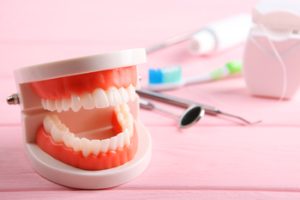Are you wondering how to make your dentures fit better?
Poorly fitting dentures can make you feel uncomfortable and insecure. The former because your gums may feel sore and tender and the latter because you fear that slippage could cause embarrassment in public.
Did you know that loose-fitting dentures can also raise the risk of malnutrition and lower nutritional intake?
Dentures are a quick and affordable way to replace missing teeth. And with the appearance of your smile having a significant impact on your appearance and self-esteem, they need to fit and function well.
So, why do dentures feel uncomfortable?
Dentures may feel uncomfortable for several reasons and include:
- Migration of your natural remaining teeth
- Your denture has warped or changed shape
- Bone recession
- Everyday wear and tear
Ill-fitting dentures can make your mouth feel sore and are uncomfortable and impractical. So what can be done about it?
How to make your dentures fit better – Top Tips
The first step is to get in touch with your dentist. Depending on the material, they may suggest making adjustments. Other options include:
Denture reline
A denture reline is when your dentist adds another layer of material to the base of your denture to help it fit better. The new layer follows the contours of your mouth and gum line restoring its original snug fit.
Dental adhesive
 You may have avoided using dental adhesive in the past, but it can help your dentures feel more comfortable. It can even fill you with confidence that your denture will remain in place when speaking or chewing food.
You may have avoided using dental adhesive in the past, but it can help your dentures feel more comfortable. It can even fill you with confidence that your denture will remain in place when speaking or chewing food.
Dental adhesive can also act as a barrier to prevent food particles from getting trapped beneath your false teeth and irritating your gums. Using an adhesive is also affordable to help poorly fitting dentures feel secure while you wait to see your dentist.
Have your jawbone examined
Dentures rely on the bony gum ridge for support. That, in turn, depends on support from the underlying jawbone to maintain its size and shape. Any changes in its quality, quantity and shape cause your dentures to loosen.
Unfortunately, bone loss is natural when teeth are missing, and dentures often exacerbate the process. This issue can be addressed by oral surgeons using bone or tissue grafting or other minor procedures to enhance, reshape or smooth the jawbone’s surface.
Add stability with dental implants
Dentists can provide additional support with dental implants when relining isn’t enough. While this can be done with upper or lower dentures, dentists commonly use it to stabilise a ‘floating’ lower denture. Two or more implants are surgically placed into the jaw with corresponding attachments positioned on the underside of the denture enabling the denture to snap onto the implants securing it in position. Click this link to learn more.
Care and maintenance
So now you know how to make your dentures fit better, remember that although care and maintenance won’t make your dentures fit better, they can help prevent your dentures from warping, changing shape or breaking.
Are you suffering from poorly fitting dentures?
If your dentures are causing you discomfort or pain, you might want to try and make them fit better. Why not book an appointment with the experienced dentists at Dental Excellence who can examine your mouth and dentures and make recommendations based on your best interests.
References:
NCBI – Denture Wearing and Malnutrition Risk Among Community-Dwelling Older Adults
National Elf Service – Guidelines For The Care and Maintenance Of Complete Dentures


